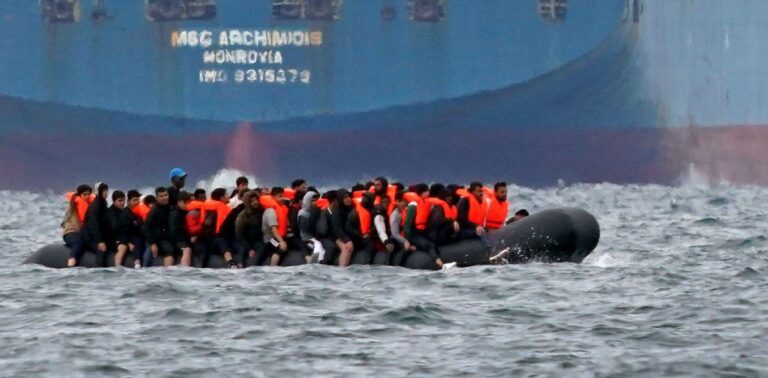The British government's controversial plan to send refugees to Rwanda has been at the heart of the UK's response to a recent surge in the number of people making the dangerous English Channel crossing in small boats. But the Rwanda plan is likely to be abandoned if the Conservative government loses the general election in early July.
In this episode of The Conversation Weekly podcast, two UK immigration policy experts explain how the Rwanda Plan has come to occupy a prominent place in the UK immigration debate – and is already shifting the wider debate in Europe about how to deal with migrants and asylum seekers, whatever happens in the election.
British Chancellor Rishi Sunak made his Conservative party's plan to send refugees to Rwanda a centerpiece of his re-election campaign, in an interview with the BBC the morning after he announced a UK general election for July 4. The policy has been blocked by a series of legal cases, but Sunak insisted that if he was re-elected, flights to Rwanda would depart in July.
The Labour Party, widely expected to win the election and form the next British government, has said it would scrap the Rwanda plan and use the money to set up a new border force of agents dedicated to targeting the criminal gangs behind the English Channel crossings. But Labour leader Keir Starmer has not ruled out processing asylum seekers overseas, if the law allows.
For Nando Sigona and Michaela Benson, the Rwanda plan is part of a wider attempt for Britain to rebuild itself after Brexit. Sigona is professor of international migration and forced displacement at the University of Birmingham, and Benson is professor of public sociology at Lancaster University. They are leading a research project looking at the long-term impact of Brexit on migration between the EU and the UK.
Mr Sigona says the rationale behind the Rwanda plan is that if migrants know they will be sent to the East African country for processing, it will deter them from entering the UK illegally.
The point of this plan is that it was never feasible from the start, and was intended to have some symbolic effect – ironically, one could argue that the government never intended to carry out the plan, but wanted it in the news to have a deterrent effect.
Benson explains that the increase in small boat border crossings is a “Brexit policy failure”, and that changes in the UK's relationship with the EU, and in particular the UK's withdrawal from the EU border regime, “have had a major impact on the increase in border crossings”.
Read more: Is the Rwanda plan working as a deterrent? Here's the evidence on the approach
When the Rwanda plan was first proposed for 2022, European leaders and EU member states largely ridiculed it. But some EU leaders have now signaled they are open to the idea of sending asylum seekers to a third country to be processed. In May, Austrian Chancellor Karl Nehamer cited the Rwanda plan, saying the UK was a “pioneer” on immigration policy. Benson said:
What we are seeing in Western Europe and other liberal democracies is precisely the mainstreaming of anti-immigrant sentiment, so that what was completely absurd and subject to ridicule a few years ago is now almost common knowledge. I think this is a trend that we need to watch closely and that is alarming.
Listen to The Conversation Weekly podcast where Nando Sigona and Michaela Benson explain the wider context of immigration plans and the impact of Brexit on UK immigration policy. This episode also features an introduction by Avery Anapol from The Conversation's UK politics team.
A transcript of this episode is available on Apple Podcasts.
News clips in this episode come from BBC Radio 4, France 24 English, BBC News, CGTN Africa, CityNews, euronews, Sky News, ITV News and DW News.
This episode of The Conversation Weekly is written and produced by Mend Mariwany with collaboration from Katie Flood. Gemma Ware serves as executive producer. Sound design is by Eloise Stevens and theme music is by Neeta Sarl. Stephen Khan serves as global executive editor and Soraya Nandy assisted with the transcript.
You can find us on Instagram at theconversationdotcom or by email , and you can also subscribe to The Conversation's free daily emails here .
Listen to The Conversation Weekly through one of the apps listed above, download it directly from our RSS feed , or find other ways to listen here.


